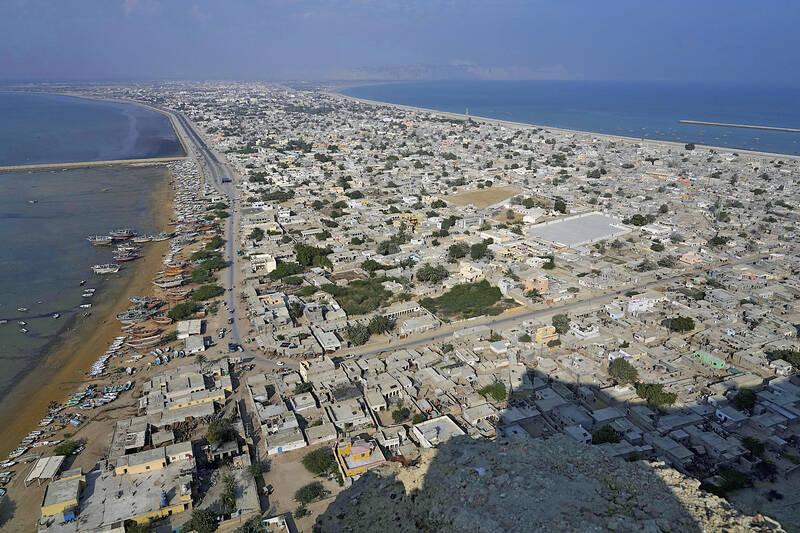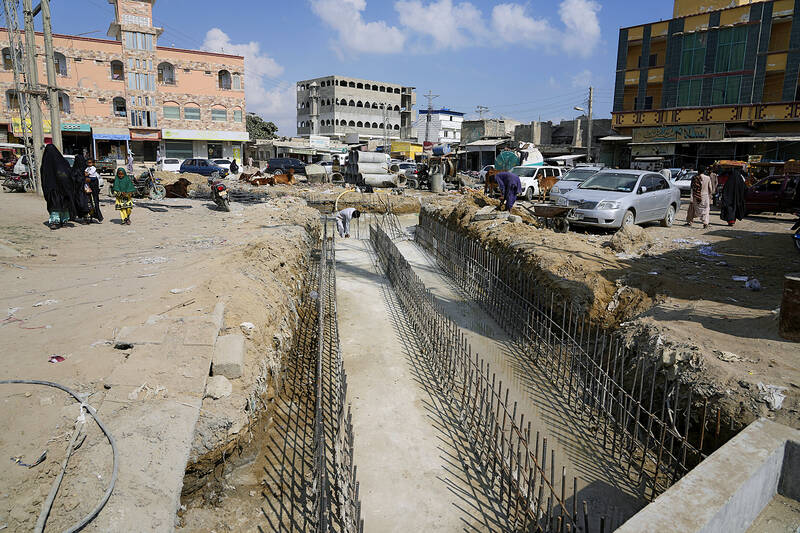There was a time when few people in the coastal Pakistani city of Gwadar understood what climate change was. After a decade of extreme weather, many more do.
Rain battered Gwadar for almost 30 consecutive hours in February last year. Torrents washed out roads, bridges and lines of communication, briefly cutting the peninsula town off from the rest of Pakistan. Homes look like bombs have struck them and drivers swerve to avoid craters where asphalt used to be.
Gwadar is in Balochistan, an arid, mountainous and vast province in Pakistan’s southwest that has searing summers and harsh winters.

Photo: AP
The city, with about 90,000 people, is built on sand dunes and bordered by the Arabian Sea on three sides, at a low elevation that makes it vulnerable to climate change in a country that has already seen its share of catastrophe from it.
“It’s no less than an island nation situation,” Gwadar-based hydrologist Pazeer Ahmed said. “Many low-lying areas in the town will be partially or completely submerged if the sea level continues to rise.”
The sea, once a blessing for Gwadar’s fishing and domestic tourism sectors, has become an existential threat to lives and livelihoods.

Photo: AP
Warming oceans mean bigger and more powerful waves, and those waves get whipped higher by summer monsoon winds. Warmer air holds more moisture — about 7 percent more per degree Celsius — and that means more big rain events.
“Waves have become more violent due to the rising sea temperatures and eroded beaches,” Gwadar Development Authority deputy environment director Abdul Rahim said. “The tidal actions and patterns have changed. Hundreds of homes have been washed away. It is very alarming.”
Melting glaciers contribute to rising sea levels, another cause of coastal erosion. The sea level at Karachi rose almost 20cm between 1916 and 2016, according to data from the US’ National Oceanic and Atmospheric Administration. It is projected to rise another 1.3cm by 2040.
In areas near Gwadar, such as Pishukan and Ganz, waves have swallowed up mosques, schools and settlements. There are gashes in the cliffs at the popular picnic spot of Sunset Park, and rocks have cascaded onto the shore. Beaches run flat for dozens of kilometers because no structures remain on them.
Authorities have built seawalls from stone or concrete to hold back saltwater intrusion, but they are a small solution to a massive problem as Gwadar’s people and businesses are fighting climate change on different fronts.
Saltwater pools on government land, salt crystals glistening in the sunshine. In the Shado Band neighborhood, former local councilor Qadir Baksh fretted about water seeping up through the ground and into his courtyard every day, held at bay only by regular pumping. Dozens of houses have the same problem, he said.
Officials, including Ahmed and Rahim, said changes in land use and unauthorized building are worsening flooding. Locals said some major construction projects have destroyed traditional drainage pathways.
CHINA
Gwadar is the centerpiece of a massive Chinese-led initiative to create an overland route between its western Xinjiang Province and the Arabian Sea through Gwadar. Hundreds of millions of dollars have poured into the town to create a deep seaport, an international airport, expressways and other infrastructure. The more sensitive projects, especially the port, are tightly secured by the Pakistani military, out of sight and off-limits to the public.
However, there is no proper sewage or drainage system for residents despite a decade of foreign investment, and Gwadar’s porosity, high water table, rising sea levels and heavier rainfall are rocket fuel for the town’s vulnerability.
“In the past when it rained, the water disappeared up to 10 days later,” Baksh said. “But the rain that came last year hasn’t gone. The water rises from the ground with such speed it will reach the four walls of my home if we don’t run the generator every day to extract it. Officials say it’s because of climate change, but whatever it is, we’re suffering.”
FISHING
Gwadar’s fishing community is also hurting. Catches are smaller, native fish are disappearing, and migration patterns and fishing seasons have changed, Ahmed and Rahim said. There is also algae bloom and the invasion of unwanted marine species like pufferfish.
Illegal fishing and foreign trawlers are responsible for a few of these things, but it is mostly rising sea temperatures.
People have migrated from places like Dasht and Kulanch because of water scarcity. What agriculture there was in Gwadar’s surrounding areas is vanishing due to loss of farmland and livestock deaths, locals said.
It is part of a wider pattern in which Pakistan’s farmers are seeing declining crop yields and increasing crop diseases due to climate extremes, particularly floods, droughts and heat waves, the UN’s Intergovernmental Panel on Climate Change has said.
“There are heat waves and dust storms in Gwadar,” Ahmed said. “But the main impact of climate change here is that there is too much water and not enough of it. If nothing is done to address this problem, we will have no option but to retreat.”

OPTIMISTIC: A Philippine Air Force spokeswoman said the military believed the crew were safe and were hopeful that they and the jet would be recovered A Philippine Air Force FA-50 jet and its two-person crew are missing after flying in support of ground forces fighting communist rebels in the southern Mindanao region, a military official said yesterday. Philippine Air Force spokeswoman Colonel Consuelo Castillo said the jet was flying “over land” on the way to its target area when it went missing during a “tactical night operation in support of our ground troops.” While she declined to provide mission specifics, Philippine Army spokesman Colonel Louie Dema-ala confirmed that the missing FA-50 was part of a squadron sent “to provide air support” to troops fighting communist rebels in

ANGER: A video shared online showed residents in a neighborhood confronting the national security minister, attempting to drag her toward floodwaters Argentina’s port city of Bahia Blanca has been “destroyed” after being pummeled by a year’s worth of rain in a matter of hours, killing 13 and driving hundreds from their homes, authorities said on Saturday. Two young girls — reportedly aged four and one — were missing after possibly being swept away by floodwaters in the wake of Friday’s storm. The deluge left hospital rooms underwater, turned neighborhoods into islands and cut electricity to swaths of the city. Argentine Minister of National Security Patricia Bullrich said Bahia Blanca was “destroyed.” The death toll rose to 13 on Saturday, up from 10 on Friday, authorities

Two daughters of an Argentine mountaineer who died on an icy peak 40 years ago have retrieved his backpack from the spot — finding camera film inside that allowed them a glimpse of some of his final experiences. Guillermo Vieiro was 44 when he died in 1985 — as did his climbing partner — while descending Argentina’s Tupungato lava dome, one of the highest peaks in the Americas. Last year, his backpack was spotted on a slope by mountaineer Gabriela Cavallaro, who examined it and contacted Vieiro’s daughters Guadalupe, 40, and Azul, 44. Last month, the three set out with four other guides

ECONOMIC DISTORTION? The US commerce secretary’s remarks echoed Elon Musk’s arguments that spending by the government does not create value for the economy US Secretary of Commerce Howard Lutnick on Sunday said that government spending could be separated from GDP reports, in response to questions about whether the spending cuts pushed by Elon Musk’s Department of Government Efficiency could possibly cause an economic downturn. “You know that governments historically have messed with GDP,” Lutnick said on Fox News Channel’s Sunday Morning Futures. “They count government spending as part of GDP. So I’m going to separate those two and make it transparent.” Doing so could potentially complicate or distort a fundamental measure of the US economy’s health. Government spending is traditionally included in the GDP because